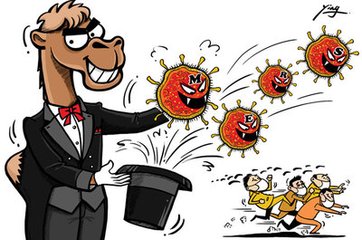PNAS:MERS病毒研发新进展

瑞士提契诺大学生物医学研究所科研人员报告说,他们分离出了一种针对中东呼吸综合征冠状病毒(MERS-CoV)的强大的人类抗体。中东呼吸综合征(MERS)是一种由中东呼吸综合征冠状病毒(MERS-CoV)导致的下呼吸道严重感染,自从2012年发现以来,它已经造成了超过1300人感染和500人死亡。现在尚没有批准的疫苗或抗病毒药物。Antonio Lanzavecchia 及其同事从来自一位中东呼吸综合征(MERS)病人的培养的记忆B细胞中分离出了一种称为LCA60抗体。LCA60有效地中和了多种中东呼吸综合征冠状病毒(MERS-CoV)毒株。这种抗体与这种病毒的调控宿主细胞识别的S蛋白紧密结合。使用诱变与计算建模的结合,这组作者确定了这种抗体与S蛋白的一个独特的部位结合。这个部位与细胞表面受体CD26的结合部位部分重叠,而LCA60阻断了S蛋白与CD26的结合,这提示了LCA60中和病毒的一种可能的机制。在中东呼吸综合征(MERS)的小鼠模型中,在感染前后注射LCA60能显著减少肺的病毒滴定度,鼻内提供LCA60也是如此。这组作者说,这些发现提示了迅速开发针对新发病毒的抗病毒疗法的一个路径。
原文链接:
原文摘要:
Middle East Respiratory Syndrome (MERS) is a highly lethal pulmonary infection caused by a previously unidentified coronavirus (CoV), likely transmitted to humans by infected camels. There is no licensed vaccine or antiviral for MERS, therefore new prophylactic and therapeutic strategies to combat human infections are needed. In this study, we describe, for the first time, to our knowledge, the isolation of a potent MERS-CoV–neutralizing antibody from memory B cells of an infected individual. The antibody, named LCA60, binds to a novel site on the spike protein and potently neutralizes infection of multiple MERS-CoV isolates by interfering with the binding to the cellular receptor CD26. Importantly, using mice transduced with adenovirus expressing human CD26 and infected with MERS-CoV, we show that LCA60 can effectively protect in both prophylactic and postexposure settings. This antibody can be used for prophylaxis, for postexposure prophylaxis of individuals at risk, or for the treatment of human cases of MERS-CoV infection. The fact that it took only 4 mo from the initial screening of B cells derived from a convalescent patient for the development of a stable chinese hamster ovary (CHO) cell line producing neutralizing antibodies at more than 5 g/L provides an example of a rapid pathway toward the generation of effective antiviral therapies against emerging viruses.
doi: 10.1073/PNAS.1510199112
作者:Davide Corti

